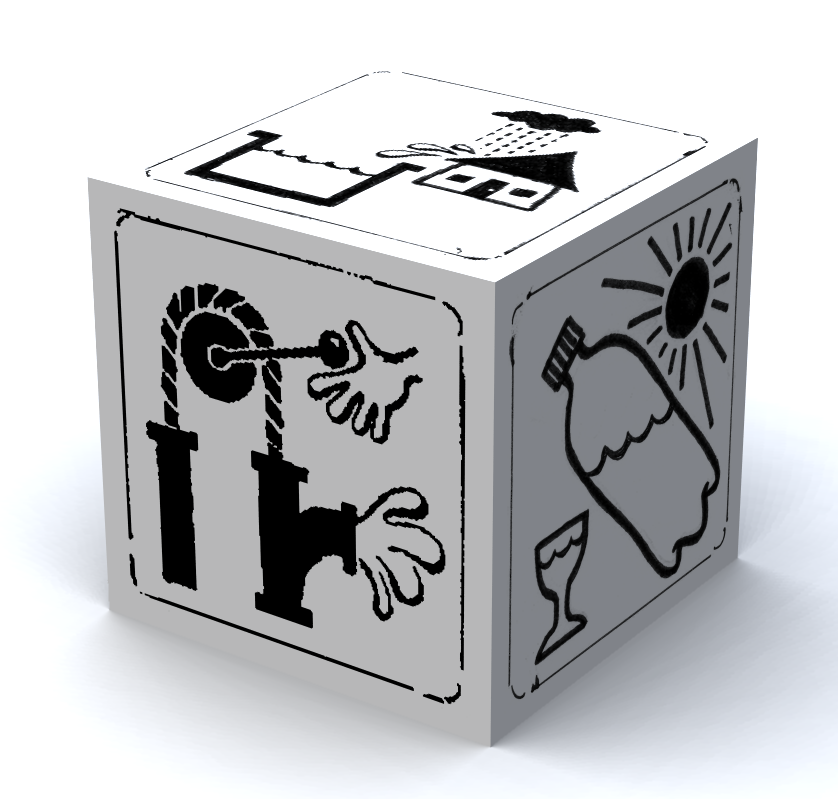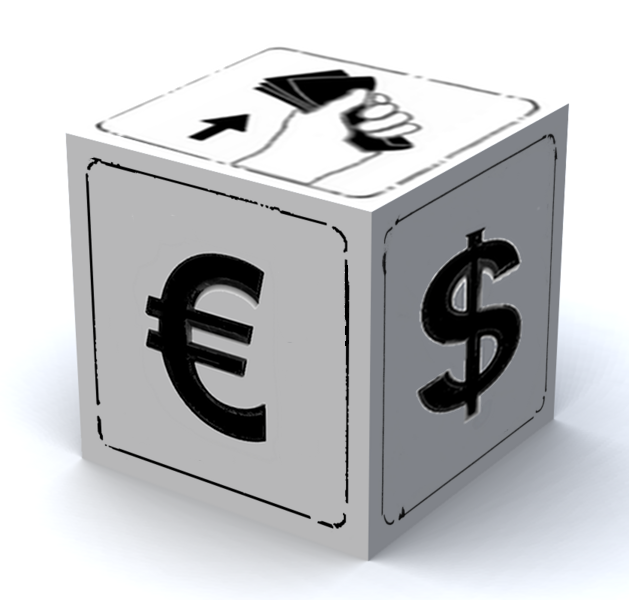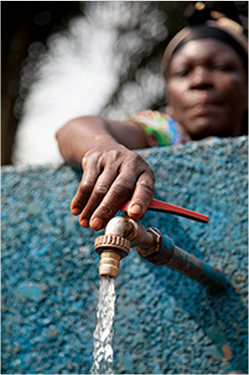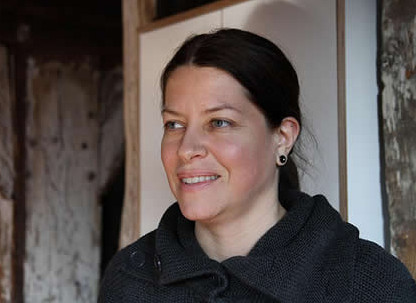|
|
| Line 64: |
Line 64: |
| | |- | | |- |
| | | | | | |
| − | * '''NEW ARTICLE PAGE:''' [[Lifeskills:_Football_for_Water|<font size="2">'''Lifeskills: Football for Water'''</font>]]. The main goal of the program is to improve drinking water and sanitation facilities at 1,100 schools in Kenya, Ghana and Mozambique. Furthermore, more than 700,000 school children will be taught life skills related to hand washing, clean drinking water and improved sanitation through football and life skills coaches (WorldCoaches). | + | * '''NEW ARTICLE PAGE:''' [[Community Based Savings|<font size="2">'''Community Based Savings'''</font>]] - Community-based saving is a microfinance model that is considered to be an effective method for financing projects in sustainable sanitation and water management. This is an effective method for saving a small amount of money by organising or joining a saving group of up to 25 people. These people might be colleagues, friends or neighbours coming from the same community. The method is very simple and easy to implement. |
| | | | |
| − | * '''SANITATION FIRST!!''' 2.6 billion people in the world don't have access to a toilet. The reality of what this means may be hard for us lucky toilet-owners to imagine, so here's an [http://youtu.be/P6wkjWxEbKY animation] to help. | + | * '''NEW ARTICLE PAGE: [[Gender Mainstreaming|<font size="2">Gender Mainstreaming</font>]]''' - Gender mainstreaming is the process of assessing the implications for women and men of any planned action, including legislation, policies or programmes, in all areas and at all levels. It is a strategy for making women’s as well as men’s concerns and experiences an integral dimension of the design, implementation, monitoring and evaluation of policies and programmes in all political, economic and societal spheres so that women and men benefit equally (gender equality) and inequality is not perpetuated. |
| | | | |
| − | * '''Check out this new helpful [[Sustainable_sanitation_training_material|Sustainable Sanitation Sourcebook]]''' in the training of professionals for the sanitation and water sector, browse or download the set of animated PowerPoints. There are 500 slides and 600 pages worth of valuable sanitation information!! | + | * '''NEW ARTICLE PAGE: [[Transparency & Accountability|<font size="2">Transparency & Accountability</font>]]''' - '''Transparency''' refers to the right of citizens to access relevant information. Openness and public access to information are vital, so that water-users can understand the decision-making processes that affect them. '''Accountability''' is a broad concept that entails several dimensions and is often used in different ways. Some see it as a mechanism to hold people and institutions accountable, whereas others may see it as a concept referring to the actual application and implementation of rules and standards. |
| | | | |
| − | * '''NEW ARTICLE PAGE: [[Biogas-fueled_pump|Biogas-fueled pump]]''' - Using biogas for pumps in irrigation is gaining in popularity in India and elsewhere, as the savings in petroleum fuel prices are great. A diesel pump can also be converted into a bio-gas pump used for pumping water. The cheapest way to get biogas, once a pump is obtained, is to build a biomass digester, which means biomass must be collected, cultivated, or found. | + | * '''NEW ARTICLE PAGE: [[Harmonisation & Coordination|<font size="2">Harmonisation & Coordination</font>]]''' - Harmonisation and coordination enables all actors – national and local government, donors, lending banks, NGOs and other water sector stakeholders – to recognise and adhere to common principles and approaches when supporting rural water services. For instance, the principle of aid effectiveness, which means external actors will better coordinate amongst themselves and align behind a recipient country's national policies, priorities, and systems. |
| | | | |
| | |- | | |- |
Welcome, bienvenue and bienvenido to Akvopedia!
|
|
Welcome to Akvopedia, the open water and sanitation resource that anyone can edit. The goal of Akvopedia is to improve water and sanitation projects through knowledge exchange on smart and affordable technical solutions and effective approaches. Akvopedia now contains 2,211 articles in English. Akvopedia is hosted and managed by Akvo Foundation.
Water Portal
|
| The Water Portal contains information on water collection, pumping and transportation, storage, treatment, and use of water.
|
Sanitation Portal
|
| The Sanitation Portal contains information on toilets, collection, transportation, treatment, use of products, hygiene, and training materials.
|
Finance Portal
|
| The Finance Portal contains information on the costs needed to finance, how to finance these costs, and how to monitor finance.
|
Sustainability Portal - NEW!
|
| The Sustainability Portal contains information on numerous sustainability frameworks, tools, and methods, using the F.I.E.T.S approach.
|
|
|
|
What's happening now
|
| Have a look at our new Sustainability Portal!
IRC and Akvopedia have teamed up to produce an all new Sustainability Portal based on the Dutch WASH Alliance F.I.E.T.S. principles of financial, institutional, environmental, technological, and social sustainability. Included are the 10-part Triple-S building blocks from IRC and other sustainability frameworks.
With over 50 new article pages and many more sustainability tools, slideshows, and videos... water and sanitation project members can now think about their WASH system's longevity with confidence.
Helpful topics include: Participatory methods; 3R (water) – Recharge, Retention and Reuse; Capacity support - local government; Life-cycle costing; Ecological Sanitation (EcoSan); Community-Led Total Sanitation; Self Supply; O&M water supply; and Monitoring.
|
More news
|
- NEW ARTICLE PAGE: Community Based Savings - Community-based saving is a microfinance model that is considered to be an effective method for financing projects in sustainable sanitation and water management. This is an effective method for saving a small amount of money by organising or joining a saving group of up to 25 people. These people might be colleagues, friends or neighbours coming from the same community. The method is very simple and easy to implement.
- NEW ARTICLE PAGE: Gender Mainstreaming - Gender mainstreaming is the process of assessing the implications for women and men of any planned action, including legislation, policies or programmes, in all areas and at all levels. It is a strategy for making women’s as well as men’s concerns and experiences an integral dimension of the design, implementation, monitoring and evaluation of policies and programmes in all political, economic and societal spheres so that women and men benefit equally (gender equality) and inequality is not perpetuated.
- NEW ARTICLE PAGE: Transparency & Accountability - Transparency refers to the right of citizens to access relevant information. Openness and public access to information are vital, so that water-users can understand the decision-making processes that affect them. Accountability is a broad concept that entails several dimensions and is often used in different ways. Some see it as a mechanism to hold people and institutions accountable, whereas others may see it as a concept referring to the actual application and implementation of rules and standards.
- NEW ARTICLE PAGE: Harmonisation & Coordination - Harmonisation and coordination enables all actors – national and local government, donors, lending banks, NGOs and other water sector stakeholders – to recognise and adhere to common principles and approaches when supporting rural water services. For instance, the principle of aid effectiveness, which means external actors will better coordinate amongst themselves and align behind a recipient country's national policies, priorities, and systems.
|
Contributing to Akvopedia
|
| Share your news and knowledge on water and sanitation by contributing articles to the Akvopedia. We've used the same conventions as the well-known online resource Wikipedia, so adding and editing articles is quick and easy to learn. This graphical guide will get you started; more detailed information about editing wiki articles is available in the help pages: Help:Contents
|
Editorial support
|
|
Do you have quality content that you would like to contribute to Akvopedia, but lack the time or resources to upload it? Akvopedia offers free editorial services and always appreciates suggestions and links to expand our WASH wiki. Please contact our editor Winona Azure at winona akvo.org. Thank you for visiting! akvo.org. Thank you for visiting!
|
|
|
|




